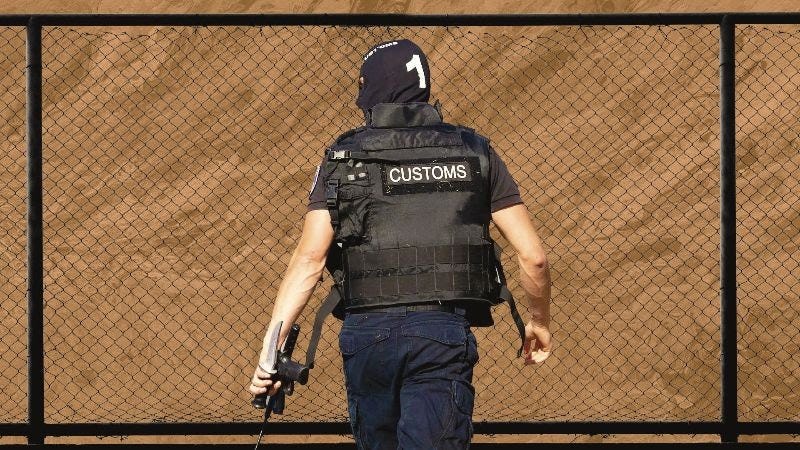Your Guide to Thanksgiving Dinner Debates
A round-up of some of the best Commonplace pieces on immigration, trade, and the future of the GOP.
With families gathering for Thanksgiving and political debates near at hand, we wanted to equip you with some of the most compelling arguments on issues that could come up around the table. The below pieces, previously published at Commonplace, remain relevant as the Republican Party continues its realignment. Want to make sense of why today’s politics isn’t what your free-trade-absolutist uncle believes it to be?
Start with Michael Lind’s prediction back in January about “Why There Won’t Be a Deportation Apocalypse.” When President Trump first took office, media outlets, liberals, and Old Guard Republicans leapt in unison to claim that his enormously popular campaign promise to deport illegal immigrants was doomed to destroy the economy. But who will pick our crops and do the work we don’t want to do?! As it turns out, absent de facto serfdom, American workers and innovative American companies are happy to fill the gap.
You would’ve seen this coming had you read Lind’s piece, which predicted:
The absurdity of the argument that there are jobs that Americans simply refuse to do for any wage is illustrated by history. Between the immigration restrictions of the 1920s and the explosion of mass immigration in the 1960s, Americans somehow managed to build houses, grow food, raise children, and care for the elderly even though the foreign-born share of the population was at an all-time low. Coincidentally or not, during the low-immigration era of the mid-twentieth century, American productivity drove a booming economy, and the U.S. created the world’s first mass middle class.
To be sure, aggregate GDP will be smaller than it would have been otherwise if large numbers of foreign nationals who have broken U.S. immigration laws are punished by deportation. …
This raises an important question: So what? The contribution to GDP growth provided by workforce expansion can be boosted by many techniques, some of them as harmful to society as mass illegal immigration. We could expand the U.S. workforce by raising the Social Security and Medicare retirement ages to 75 or 85, or abolish retirement altogether, forcing Americans to work until they die. We could repeal laws against child labor and legalize the employment of four-year-old chimney sweeps and six-year-old match girls. We could increase aggregate output by abolishing wages and hours laws. If most workers labored seven days a week, twelve hours a day, from childhood until they died of old age, U.S. GDP would rise considerably, even as per worker productivity remained the same.
But what, exactly, is new about the Republican Party, anyway? What happened to the old one—the Reagan-inspired Right remembered so fondly by older generations of conservatives? Patrick Ruffini, in “No Going Back for the GOP,” has you covered. He unpacks why “Donald Trump’s 2024 victory represented not only a personal success; it validated a strategy that doubled down on working-class support to secure a Republican win in the popular vote for the first time in 20 years.”
And ironic as it may seem, what Trump did for the GOP, and how he did it, are both reminiscent of President Reagan’s realignment, as Ruffini explains:
Republican elites remember a Reagan who upheld conservative thinking on all fronts, the so-called “three legs of the stool.” He valiantly stood up to the communists, unleashed the American economy with tax cuts, and brought social conservatives front and center.
But in terms of the new voters brought into the coalition in these early years, then as now, cultural issues played a central role… Such issues speak to voters’ fundamental values, immune to fluctuations in the economy and assessments of the direction of the country. Once working-class voters became culturally estranged from the Democrats, it was difficult for them ever to go back. …
In Donald Trump, many who were disciples of Reagan saw another muscular figure who had come to reverse American decline, with the main challenges upon his arrival being immigration and the hollowing out of America’s industrial base. The political impulse was the same, even if elites would characterize the men as representing polar opposites within the Republican Party.
Finally, perhaps no policy issue is more contentious, both within the GOP and across the political spectrum, than Trump’s tariffs. While institutionalist critics may contend that unrestricted free trade represents the wise progeny of the invisible hand of the market, that self-serving description simply isn’t the case. As Nicholas Phillips wrote back in February, “The Deep State Loves Free Trade.”
As Phillips explains:
Free trade is the ultimate institutionalist position, fought for tooth-and-nail for 70 years by the exact class of lawyers, lobbyists, and national security spooks that Glock and Pino pretend to disdain. Cold Warriors first opened the U.S. market as a carrot to coax geopolitical cooperation out of our trading partners. … As the founder of the free trade standard-bearer Peterson Institute acknowledged, “the economic argument was always marginal” for free trade. “It was the foreign policy case which provided the real impetus for liberal trade policies in the United States in the postwar period.” This is the actual, rather than the rhetorical, deep state.
…
Like much of the trade commentariat, [Judge] Glock and [Dominic] Pino assume that this system represents a kind of libertarian equilibrium, a state-of-nature trade Eden that protectionism is despoiling with special-interest meddling. … the global free trade system is itself the outcome of lobbying and legal wrangling on behalf of special interests orders of magnitude more powerful and intense than anything that went into Trump’s tariffs.
Happy feasting from all of us here at Commonplace.







Sigh. I give up if Oren et al think the deportation debacle we’re witnessing is merely about economic statistics. I suspect like most establishment elites, they haven’t ventured far from their safe spaces. This isn’t a question of labor force participation. It’s a question of human decency and our character as a nation.
Oren, they sent a swat team with a video crew to arrest the sandwich man for gods sake…after he offered to turn himself in. And why the masks? Why the foreign prisons? Why the lack of due process? Maybe plucking moms out of school pickup lines is cool with Commonplace. Not me.
And BTW, the year+ old poll cited is not just old, it came from a time when voters thought deportation was about the violent criminals Don rambled about. Today, his polling is underwater on immigration as they seize the guys weed whacking at Home Depot. Maybe the immigration czar taking 50k in a brown bag piled on top of the cruelty made a difference? None of it sounds very Christian, does it?
Welcome to the “new” right. Its leader (for whom two of his three wives are immigrants) tells us these fellow humans are "vermin". An "infestation" that's "poisoning the blood" of our nation.
Anyone at Commonplace remember which "leaders" from history used such terms?
Oh Oren. . you just don't get it. The debate that Americans really need to have isn't over the right-wing populist policies you espouse and self-styled WSJ-reading-Paul-Ryan-small-government-conservatives. The debate should be over which segment of America is benefitting the most from Trump's economic policies.
Maybe you should talk to David Sacks about this? He's been steering critical tech policy on AI and Crypto in a way that directly benefits him and his billionaire friends. As a special WH advisor, he suggested hosting an "AI Summit" that would require sponsors to pay $1M each to his podcast, "All In", in order to be invited to an exclusive dinner. This was so brazen that even the WH pushed back on this, but remind me: How is this helping the average American in Erie, PA?
Oh, that's right. They are benefitting from having to pay *only* 20% of the tariffs costs that are apparently being passed through from importers. What a great deal.